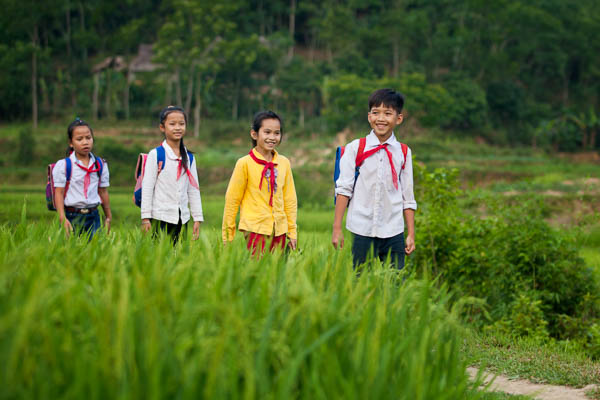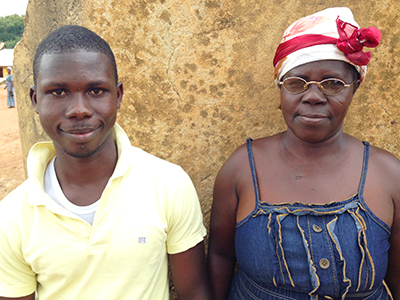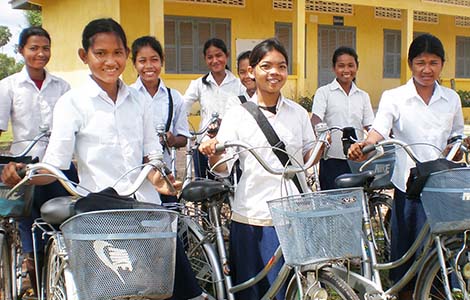
Working hand in hand with families, communities & nations so children can thrive in school
 Winrock International promotes access to safe education by improving children’s physical safety and emotional well-being, and fostering an enabling environment in which children can thrive. This means helping communities and schools create safe, supportive spaces for girls and boys alike; empowering families and communities to monitor children’s safety; and improving families’ livelihoods so they are more likely to keep their kids in school. As part of the 16 Days of Activism Against Gender-Based Violence Campaign, Winrock International is highlighting its programs that bring attention to this year’s theme, “From Peace in the Home to Peace in the World: Make Education Safe for All!” The 16 Days Campaign begins on International Day for the Elimination of Violence Against Women (November 25) and ends on International Human Rights Day (December 10) and emphasizes that gender-based violence in its many forms is a human rights violation. More information here.
Winrock International promotes access to safe education by improving children’s physical safety and emotional well-being, and fostering an enabling environment in which children can thrive. This means helping communities and schools create safe, supportive spaces for girls and boys alike; empowering families and communities to monitor children’s safety; and improving families’ livelihoods so they are more likely to keep their kids in school. As part of the 16 Days of Activism Against Gender-Based Violence Campaign, Winrock International is highlighting its programs that bring attention to this year’s theme, “From Peace in the Home to Peace in the World: Make Education Safe for All!” The 16 Days Campaign begins on International Day for the Elimination of Violence Against Women (November 25) and ends on International Human Rights Day (December 10) and emphasizes that gender-based violence in its many forms is a human rights violation. More information here.
For more than two decades, Winrock has been a leader in creating educational opportunities for children and youth, especially girls and boys at the margins of society.
Our programs offer a variety of support — scholarships, mentoring, life skills training, literacy and numeracy training, community support, and policy advocacy. Where children and youth are out of school, we work on multiple levels to ensure that children can be safely withdrawn from child labor, human trafficking, commercial sexual exploitation, and other forms of abuse.
For example, Winrock’s Raising Family Income and Supporting Education (RISE) program empowers women and promotes education by pairing business training, loans, and grants for mothers with educational support for primary school students. The premise for these programs is simple: in exchange for receiving a business loan or grant, mothers must keep their children in school.
In Côte D’Ivoire, Ghana and Tanzania, a study on the effectiveness of RISE showed that 98.8 percent of children who had been beneficiaries of the program in the three countries had completed or were still enrolled in school, compared to 82.1 percent of children who weren’t in the program. Women explained that the program contributed to their ability to keep children in school, as did awareness-raising activities on the importance of education.
As one community member in Côte D’Ivoire noted, “Last year, only four children in our village passed to middle school. This year, 17 passed, thanks to the scholarship and microcredit. The number one child in the whole village was a scholarship recipient.”
At the community level, Winrock helps create and support watchdog groups such as Child Labor Monitoring Committees (CLMCs), which report on the withdrawal of children from child labor, while monitoring them to ensure they stay in school. These groups also provide mentoring support to children and lead awareness-raising activities in their communities, particularly regarding the worst forms of child labor and the importance of education.
 In Cambodia, Winrock’s U.S. Department of Labor-funded CHES program established or strengthened CLMCs in 160 villages to monitor children at risk or engaged in child labor. The target group included girls aged 12-14, the transition period from primary to secondary school, when girls are particularly vulnerable to dropping out and migrating to work in garment factories in Phnom Penh. There they face unpleasant or abusive working conditions and – if fired or laid off – are at risk of being trafficked for commercial sexual exploitation.
In Cambodia, Winrock’s U.S. Department of Labor-funded CHES program established or strengthened CLMCs in 160 villages to monitor children at risk or engaged in child labor. The target group included girls aged 12-14, the transition period from primary to secondary school, when girls are particularly vulnerable to dropping out and migrating to work in garment factories in Phnom Penh. There they face unpleasant or abusive working conditions and – if fired or laid off – are at risk of being trafficked for commercial sexual exploitation.
At the national level, Winrock provides support to governments to pass laws and strengthen policies that criminalize actions that are abusive to children and negatively affect their ability to access education. When we began implementing our USAID-funded anti-trafficking program in Bangladesh in 2008, the national law against human trafficking only included women and girls, even though boys and young men were also being kept from school and trafficked for bonded labor, organized begging, farm and factory work, and commercial sexual exploitation. Winrock helped shape a new, more inclusive anti-trafficking law in 2011, and led the drafting of two subsequent National Plans of Action, which set concrete objectives, timelines, and roles and responsibilities to implement the law.
Through these high-level policy changes, children and youth in Bangladesh now have a legal framework of protection, mechanisms to prosecute their traffickers, and access to resources that they can use to complete their education.
Read more from Côte d’Ivoire in the first blog from this series of three.
Read more from South Sudan in the second blog.
